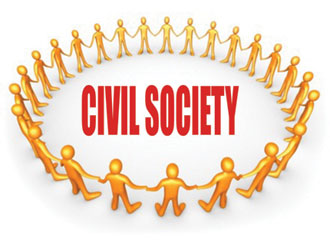
|
 |
 |
|
|
|
|
|
|
|
|
|
|
|
|
|
|
|
|
|
|
|
|
|
|
Towards a Free & Independent Civil SocietyStates have sharply diverging views on civil society institutions, whereby three patterns emerge with regard to dealing with non-governmental organizations (and also to some extent the opposition political parties which usually share many of the goals and activities of civil society groups). These patterns can be listed as follows: 1. Confrontation & Hostility: Some states do not even allow the establishment of civil society institutions and consider them as a threat given their potential to end up as a partner in the decision-making process involving any issue. Therefore they outlaw the formation of NGO’s and bar them from being officially registered. Sometimes there would not even exist a law for NGO’s. In cases where organizations do get set up, such as charities, the government intervenes and forces them to be legally attached to an official authority (a mini?try or a governmental institution). As such, the civil activity becomes restrained by government’s rules and regulations thus discouraging citizens from interacting with it. In other instances, these countries deliberately suppress activists and volunteers by raiding their workplaces, confiscating their equipments and throwing them in jail under the pretext of breaking the law.
2. Restricted Approval: This refers to cases where restrictions are either partial or full. Some countries allow NGO’s to operate without interference in certain issues but restrict them in others and limit their activities, and not only refrain from helping them but also impose arbitrary laws in order to hinder their activities. Some of the methods used to restrain the civil society and strangle the free environment include; not allowing civil society groups to work freely or adopt stances contrary to those taken by the authori?ies as well as preventing them from questioning the performance of authorities. The latter also withholds information on public matters, especially in societal issues in which the civil society is supposed to contribute to finding solutions. At the end of the day, these countries would have deprived themselves and their communities from the value added and services offered by civil society organizations because they have created a general security and political atmosphere that is not conducive or encouraging to any civil activities. 3. Complete lifting of Restrictions: This is where some states allow the growth of civil society organizations out of the realization of their extreme importance in any lively society to solve its problems and improve the performance of the state and bring important issues to the attention of the government and add community and youth energies that would contribute to the decision-making and to the tackling of the problems on the ground, beside other roles. These states allow the establishment of organizations, with varying orientation, and provid? them with the political and legal environment that is conducive to their work, and even put in place certain tax laws that encourage individuals to donate to charities. Some states go as far as allowing peaceful activities even if they came from non-legally registered organizations. There is a huge variation in the vision between countries that look upon civil society organizations as partners in development, policies and public service and those who consider them a threat and a burden or a troublesome competitor to authorities. The larger the space that encourages the growth of civil society, the higher the prospective of the emergence of a lively and active society that is conscious of its responsibilities and is moving towards building a democratic state. This is because communitie?, where free and independent civil society flourishes, would most certainly have the potentials to develop and their citizens would possess the tools to dismantle the chains of tyranny through practical involvement in the process of change, and through the freedom of expression and assembly that has the capacity to destroy the foundations of underdevelopment. It is no wonder then that the existence and effectiveness of civil society organizations is viewed as an indicator and a prelude to the growth of democracy in a country. It should also not come as a surprise that non-democratic countries are aware that the effects of expanding community partnership in decision-making through the institutions of civil society, even if confined to non-political topics, will ultimately lead to the development of political, social, economic, educational and other systems. Some view this as an advantage and a benefit while others see a risk, hence the different perceptions towards the civil society. The benefits of civil society to any state are tremendous, as such a civil society could : relieve the burden in the fields of combating poverty and economic inequality, fighting corruption, preserving the environment, spreading awareness, culture and moderation, fighting incitement and hatred, standing up to violence and preventing crime, rehabilitating and empowering the youngsters as well as women, educating the society on the issues of social justice, contributing to the protection of consumer rights? and providing social services as well as proving to be of great significance during disasters. There are other benefits that are of no less importance. Civil society contributes to the promotion of public freedoms and defending them, strengthening the rule of law and accountability, upgrading the levels of transparency, protecting minorities and the rights of vulnerable groups in the community among many other benefits. To sum up, the civil society represents the cornerstone of stability in the community, preventing unrest, strengthening the rule of law, consolidating the stability of the political system and improving its performance and protecting it from the evils of violence. |
